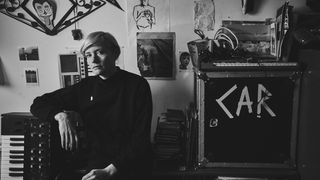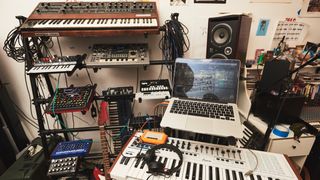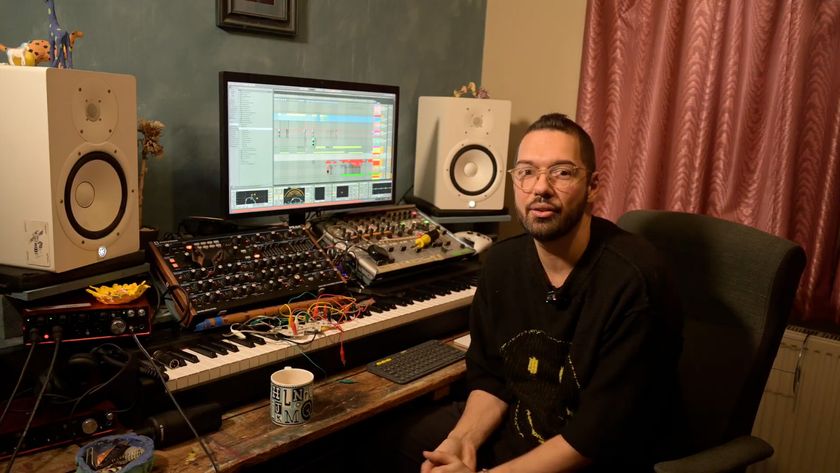Producer Masterclass - C.A.R.: “ If I know too much, maybe those happy accidents won’t happen”
“Stay punk… I’m self-taught and have always tried to embrace my imperfections,” says Chloé Raunet
MTS 2020: London-based Canadian Chloé Raunet is currently making music under the moniker C.A.R. (Choosing Acronyms Randomly), although has been involved in music production since the early 2000s when she was asked to produce some demos for Two Lone Swordsmen (Andrew Weatherall and Keith Tenniswood).
After a stint fronting the band Battant - with whom she toured and supported the likes of Ladytron - Raunet released her debut album as C.A.R., My Friend, in 2014, followed by PINNED (on Ransom Note) in 2018.
Since building a reputation for producing at “the weirder edges of electronic music,” she has also become an in-demand remixer and DJ, and it’s her remixing skills that we’re focussing on in this Producer Masterclass.
Raunet runs through two remixes of tracks by Ride guitarist Andy Bell under his Glok moniker, and US band The Imbeciles.
But, before we get into the machinations of how to add your own mark to two very diverse pieces of music, let’s find out more about C.A.R.’s life at the weird edge…
The C.A.R. journey
“I moved to London from Canada (via Marseille) when I was a teenager, and fell into this game by chance in the early ‘00s,” Raunet explains. “Back then, I was totally immersed in the Shoreditch electro scene, going to parties like Haywire and Wang. I hadn’t really thought about making music but started writing little songs for my pals on the dancefloor. It was just for a laugh at first, but after a drunken night in Paris which culminated in the perfect press shot, my friend Mole and I decided to try to do something a bit more substantial, seeing as we looked the part and all!”
Raunet and Mole’s efforts eventually came to the attention of the late, great Andrew Weatherall, along with fellow Two Lone Swordsman Keith Tenniswood, and they were then invited to record a two-track demo.
Get the MusicRadar Newsletter
Want all the hottest music and gear news, reviews, deals, features and more, direct to your inbox? Sign up here.
“Pretty soon, these CDs were doing the rounds,” Raunet recalls. “I remember being out in Barcelona during Sónar, walking into a bar and hearing a familiar sound coming from the speakers. It took a few seconds for me to clock it as one of ours!”
Soon after returning, she was asked to play live, so not only had to gather enough songs together for a set, but also get enough musicians to form a band, which turned out to be Battant.
“We enlisted the help of Tim Fairplay and over the space of a month we hashed out enough music for a short set. After releasing one EP on the Haywire label, we went on tour with Ladytron and Adult. I guess there was a bit of a buzz around us, but our formation of laptop, guitar and vocals wasn’t what people expected back then, especially as we were writing songs instead of dance music. The lack of live drums definitely raised some eyebrows and we struggled to properly fit into any scene, at least in this country.”
Raunet and the band eventually found success across the channel, signing to Parisian night club Le Pulp’s label Kill The DJ, and then releasing a debut album No Head.
“By this time, Mole had left and a new, young recruit and multi-instrumentalist, Joel Dever, had stepped in to man the synths and laptop. We did pretty well off it, especially in France, but being on the road can be strenuous.

“Eventually, Tim went his own way, leaving Joel and me to write album number two. We were really close friends and it was an easy and natural process, but as good as things were in the studio, we struggled to nail it live. It seemed all the formations we toyed with lacked the energy of the original trio.”
Events would then take an unpredictable, tragic twist: Joel died a few days before the album was due to come out. In the midst of that, Raunet had to proceed with plans alone.
“It was brutal,” she recalls, “but I decided to honour our bookings and hit the road with a session band. In retrospect I think I was motivated more by self-preservation than logic. Having something concrete to focus on and something to do would save me ending up the same way, but it was an absolutely horrendous experience. All I will say is it was down to all this that C.A.R. was eventually born.”
“I had a queue of pent-up emotions to comb through and the best way I knew was through music,” she continues. “Having never produced on my own, it was a sharp learning curve, but at that stage I couldn’t fathom writing with anyone else. As a result, my first solo album My Friend was a pretty cathartic experience.
“Kill The DJ put it out and again, it did well in France and I managed to get a bit of money to mix my next LP with Steve Osborne out at Real World Studios. That was a super cool, ‘pinch-myself’ process. He’s such an interesting guy and I learned loads from him.
“We finished PINNED at the end of summer 2015, but I had to move labels so it didn’t come out until February 2017. Since then, I’ve been with UK imprint Ransom Note Records.
There’s only so much you can do as an individual and even when you’re producing on your own, getting a fresh set of ears involved can be a good thing.
“I love working with them. Not only are they just down the road, but they’re super enthusiastic and very proactive. It’s great being with people who’ve so much energy and passion.”
The whole experience sounds like an extremely emotional one, but it has left Raunet with a strong sense of where she wants to go with her music and a very clear production philosophy as well.
“Stay punk,” she states. “I’m self-taught and have always tried to embrace my imperfections, allowing things to happen intuitively as opposed to pouring over hours of tutorials. I’m also not afraid to ask for help. There’s only so much you can do as an individual and even when you’re producing on your own, getting a fresh set of ears involved can be a good thing. For me, this happens at the mix.
“I also know what interests me (the writing/production side of things) and I know my limitations. If I wanted to hone the studio skills, I would’ve educated myself years ago. In fact the opposite is true. You could almost say I’m scared to lose the naivety of being DIY. If I know too much, maybe those happy accidents won’t happen.
“The same goes for singing. I’ve lost count of the amount of people who’ve suggested I take lessons over the years. It used to knock my confidence, but now I think of my voice as an instrument in itself, one I’m happy to employ. It’s unique and it sounds like me. Sure it’s not for everyone, but I’m cool with that. I’d rather appeal to fewer people than sound run-of-the-mill.”
By now we’re getting the sense that Raunet is a fan of more left-field thinking, so you won’t be surprised to learn that her introduction into the world of computer music production was anything but conventional.
“Back before Mole and I recorded our first demo,” she recalls, “I’d been in Detroit filming a documentary on techno music. My then boyfriend and I had spent a few weeks interviewing all these legends - like Mad Mike, Octave One, Juan Atkins, Robert Hood and Ron Murphy - when we met [DJ and producer] Magda playing at a Minus party in the basement of our hotel. We wanted to interview her too, and ended up going out to Windsor [just over from Detroit, in Canada] where she was living with [Canadian DJ] Marc Houle.
“When he heard we were staying at the hotel, he insisted we pack our things and head out to his for the rest of our trip. Back then, he was still working as a graphic designer, but had this incredible studio with all these vintage synths. Despite my love of dance music, I didn’t know much about them. He gave me a crash course and sent me back to the UK with a copy of Reason, and that’s how I got started.”
That’s probably the coolest introduction to computer music production that we’ve heard, and since that Reason debut, Chloé has remained in the hi-tech studio world… with occasional dalliances into the very low-tech.
“For years I relied heavily on soft-synths, caning the Arturia and Native Instrument packs,” she says. “I also owned a Korg Poly 800 and a MicroKorg, an electric guitar and this wonderful, red, homemade bass with a distinct non-bassy sound (super prominent in the second Battant album and the first C.A.R. LP). I also had an electric piano and a load of cheap percussive bits, including a jar of rice and a squeaky chair, both of which made it into a lot of my tracks, heavily drenched in FX.”

“Recently my flatmate’s moved his studio into the house so there’s a lot more to play with. His Korg Polysix and Yamaha CS01 are featured on my new album, as well as the Teenage Engineering OP-1 and my Korg Minilogue, which I also use live.
“Since setting up the studio properly, I’ve been getting a lot of use out of a Moog Minitaur, Arturia MicroFreak, Roland Boutique JU-06A and Analogue Solutions’ Impulse Command, although I’m still trying to get my head around the latter. There’s a Prophet-5 - it needs a clean but that hasn’t stopped me from trying to get some strange sounds out of it. I also have an Eventide H9 pedal which I go through phases of using loads, before packing it back into the bag. It hasn’t featured as much recently, but I know it’s one of those super handy bits of kit I’ll come back to soon enough. And of course there’s my Beta 58 mic! I’ve been recording with it almost exclusively since Battant.”
Anything on the studio wish list?
“Yikes, there’s a lot of things I’d love to have, including a Roland CR-78 [vintage drum machine], EMS VCS3 [vintage synth], and Eventide H3000 [legendary effects box]. I think I need to win the lottery for most of that though, so for now I’m pretty happy with what I’ve got. I would really want that EMS VCS3, though; it’s unattainable, but it would be great if someone could make an affordable clone (there are some out there but they’re still in the thousands). From what I understand, getting the price down is easier said than done. There’s also the fact a lot of replicants start sounding like soft synths. I don’t really see the point in that.”
“I don’t think I stick to a typical structure,” Raunet perhaps unsurprisingly tells us when asked about her song-making ethos. “Sometimes I start with the drums, sometimes I’ll get a little bassline in my head, sometimes I’ll just open up a plugin synth and start messing about with sounds or melodies, and sometimes I’ll start with the lyrics.
“I think this goes with my intuitive ethos. It also helps keep things fresh. When I’m struggling to find inspiration, that flexibility really comes in handy. I also have loads of starts to tracks I can delve into - little loops or sketches I might have shelved ages ago which can trigger an idea.”
“You should never throw anything away,” she continues. “You might hate something at the time, but that doesn’t mean it won’t come in handy in the future. I can’t count the number of times I’ve been stuck and opened up some random session I’d completely forgotten about. 90% of it might be rubbish, but with fresh ears, a single part might be all you need to set you down a new, exciting path. Don’t be scared to experiment and don’t be frightened of failure. It’s a cliché, but you learn a lot from messing up.”
One standard that Raunet does employ more often than not is, well, not that standard: “I use my voice as an instrument as much as I do for lead vocals. It can be chopped up or looped into sequences, repitched or treated with harmonics. Also, anything can be percussion. I mentioned before that I had a squeaky studio chair which made it into a lot of my tracks. I’ve even used my cat’s meow!”
With her booming career as a remixer and third solo album Crossing Prior Street just released, Raunet is clearly as busy as ever, and if you add the DJing and band experience into the mix, she’s in a great position to dish out some bits of advice…
Crossing Prior Street is out now on Ransom Note Records. For more info, visit the C.A.R. website.
This Producer Masterclass originally appeared in Computer Music 284 (August 2020)


Computer Music magazine is the world’s best selling publication dedicated solely to making great music with your Mac or PC computer. Each issue it brings its lucky readers the best in cutting-edge tutorials, need-to-know, expert software reviews and even all the tools you actually need to make great music today, courtesy of our legendary CM Plugin Suite.

“My love letter to a vanished era that shaped not just my career but my identity”: Mark Ronson’s new memoir lifts the lid on his DJing career in '90s New York

“I'm always starting up sessions and not finishing them, but I don't see that as unproductive”: Virtuosic UK producer Djrum talks creativity and making Frekm Pt.2









